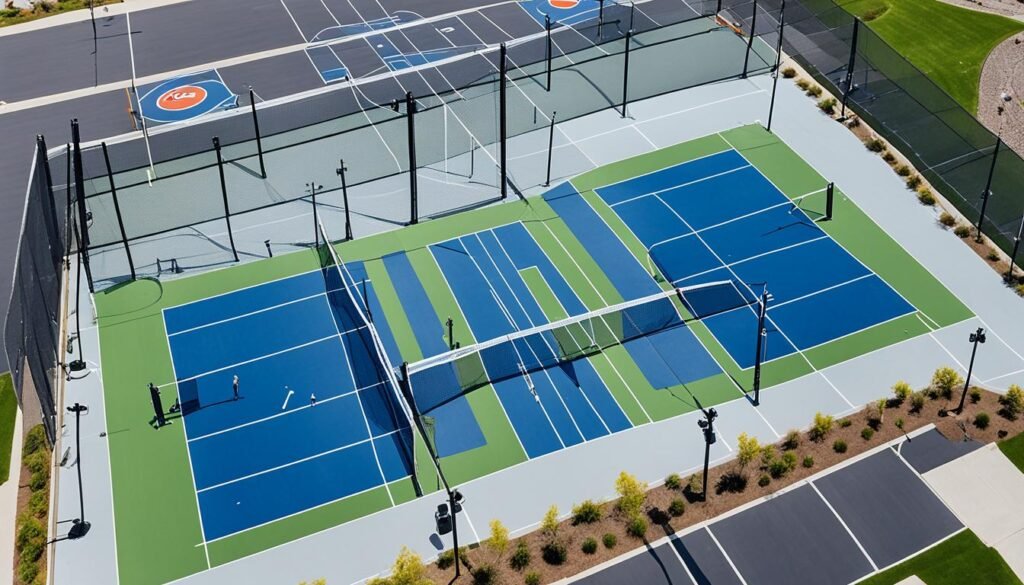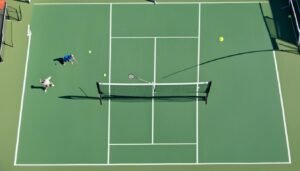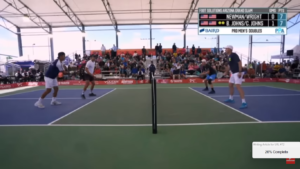Did you know some, often missed, pickleball rules could lead to penalties or violations? These rules are crucial for your game’s outcome. We’ll look at these overlooked pickleball rules, using the IFP Official Tournament Rulebook and other trusted sources.
Key Takeaways:
- Understanding and following the pickleball rules not only ensures fair play but also prevents penalties and violations.
- Awareness of serving rules, net touching rule, 10-second rule, timeouts, distractions, line-calling etiquette, and other lesser-known rules is essential for a successful pickleball game.
- Adhering to proper pickleball etiquette fosters a sense of sportsmanship, fair play, and enjoyment for all players on the court.
- Always consult the IFP Official Tournament Rulebook or refer to reliable sources for accurate information on pickleball rules.
- Remember, pickleball is not just about winning, but also building a sense of community and camaraderie.
Serving Rules You Should Know
When playing pickleball, knowing the rules for serving is key. The way you make your serve is very important. It ensures that everyone plays fair and by the rules.
IFP Official Tournament Rulebook says serves must be underhand. Players should swing their paddle upwards from below their waist. They must hit the ball at their navel level.
The serve should be like throwing the ball up in an arc. The paddle’s highest point needs to be below your wrist as you move. These rules help make sure serves are accurate and fair.
Not following these serve rules can be a fault. This happens when a serve doesn’t meet the set rules. Knowing and following these rules is crucial to avoid penalties and keep the game fair.
Pickleball serve rules encourage underhand serving to keep the game honest. By following these rules, players can ensure the game’s integrity.
Let’s break down a proper pickleball serve step by step:
- Stand behind the baseline with one foot touching or behind the line.
- Hold the pickleball paddle below waist level.
- Use an underhand stroke, swinging your paddle upwards.
- Hit the ball at navel level or below while serving.
- Keep the highest point of your paddle below your wrist throughout the serve.
- Serve the ball diagonally to your opponent’s service court.
By doing these steps, players can serve correctly within the game’s rules.
If you break the serve rules, you might lose that round. It’s up to players to respect the game’s spirit and its rules.
Remember, for a legal serve, it should be underhand, below the waist, in an upward motion, and with the paddle’s highest point below your wrist. These rules are set to make the game fair and fun for everyone.
The Net Touching Rule
In pickleball, knowing and following the net touching rule is important. This rule is found in the IFP Official Tournament Rulebook. It talks about what happens if a player touches the net or post.
If you, your clothes, or your paddle touches the net during play, it’s a fault. Whether you’re playing singles or doubles, breaking this rule means your team loses the rally.
Touching the net can mess up the game and give an unfair edge. All players should follow this rule to keep the game fair. This way, everyone can enjoy playing by the same rules.
“Net touching might look small, but it can change a rally or an entire game. Players need to be careful not to touch the net and play by the rules.”
The Impact of Net Touching
When any part of you or your gear touches the net, it’s a fault. Let’s look at what this means in different situations:
- Your paddle touches the net as you hit the ball back.
- Your clothes touch the net while you’re playing.
- You bump into the net post by accident.
In all of these cases, a fault is called and your team loses the rally. This can be really frustrating, especially if you were close to winning the game.
Even though accidents happen, everyone must try to avoid the net. It’s not just about following the rules. It’s also to make sure the game is fair and fun for all.
The Importance of Awareness and Focus
To avoid net touching, you need to be skilled and alert. Keep a good distance from the net and watch your steps on the court. This can help you avoid the net without trying to.
Plus, always keep your eyes and mind on the game ball, especially near the net. Focusing on the game helps you make fewer mistakes. It makes you a better player and makes playing more fun for you and everyone else.
Summary
The net touching rule is there to keep pickleball fair and fun. Stay away from the net to play by the rules. This lets everyone enjoy the game equally, focused on skill and sportsmanship.
| Violation | Consequence |
|---|---|
| Player, clothing, or paddle touches the net or net post while the ball is in play | Fault declaration and loss of the rally |
The 10-Second Rule
The 10-second rule is key in pickleball. It sets time limits for serving and receiving. Players must serve or be ready to receive within 10 seconds after the score is called.
This keeps the game moving well. Without it, matches could slow down a lot.
Not serving or being ready on time means trouble. First, a technical warning is given. But, keep delaying, and the other team gets a point.
The rule is there to stop slow play and keep fairness. Everyone enjoys the game more when players are on time.
Noteworthy Pickleball 10-Second Rule Violations
Examples of breaking the 10-second rule include:
- A server takes too long to serve after the score is called.
- A receiver is often late to be ready to receive.
- Players slow the game on purpose to mess with the flow.
Players need to follow the 10-second rule. But, refs must also make sure it’s followed. This helps keep the game fair and honest.
Now let’s talk about another important rule in pickleball: the net touching rule.
Timeouts in Pickleball
In pickleball, timeouts offer a chance for teams or players to regroup or take a break. Knowing the rules around timeouts helps make better use of them.
Players or teams can have up to 2 timeouts each game, lasting 1 minute each. These must be called before the ball is in play or before a serve.
When playing by the 21-point scoring system, teams are allowed 3 timeouts per game.
A timeout isn’t just for catching your breath. It’s a time to plan with your team. Talking about your game plan, checking out what the other team is doing, and focusing can really change the match’s outcome.
When you call a timeout, make sure you talk clearly with your team. Everyone should know what to do next.
Maybe you need to get your energy back, rethink your strategy, or just pause. Using timeouts wisely can make a difference in your game.
Now, let’s look at how distractions and talking on the court are handled in pickleball.
Distractions and Communication
Good communication is vital in pickleball. But, it’s crucial to know the limits and avoid actions that might distract your opponent. The rulebook for tournaments set by the IFP is clear. It says you can’t do things to break your opponent’s focus, like yelling or stomping, when they’re hitting the ball.
Team talks are usually fine, but be careful when your opponent is about to hit the ball. Too much noise then, and you might be breaking the rules. It’s key to think about your opponent and keep the game fair and respectful.
Referees are in charge of making sure everyone plays by the rules. They watch for any violations that might disturb the game. If anyone does break the rules, they could lose the point. This might even influence who wins the game.
Referee’s Judgment
Referees are crucial for spotting distractions and deciding if a rule has been broken. They keep the game fair. Referees watch the game closely. They decide if players’ actions are affecting the other team’s performance. Their main job is stopping distractions and ensuring the game goes smoothly.
“Effective communication is crucial in pickleball, but players must be mindful of not crossing the line into distractions that can hinder their opponents’ performance.”
Respecting the rules and your opponents makes pickleball more fun for everyone. Remember, being a good sport and playing fairly are just as important as the game’s skills and strategies.
| Violation | Consequences |
|---|---|
| Engaging in distracting actions (yelling, stamping feet, etc.) | Loss of the rally |
| Loud communication during opponent’s stroke | Loss of the rally |
Showing good sportsmanship and following the rules makes you a positive part of the pickleball community. This is important both on and off the court.
Serving Errors
In pickleball, serving correctly is key to avoid serving errors. The IFP Official Tournament Rulebook has specific rules for this. They make sure the game is fair and keeps its integrity.
A key mistake is not clearing the kitchen line. The kitchen, or non-volley zone, is near the net. It’s where players can’t hit the ball on the fly. The server must be behind the baseline to serve. And the serve must go beyond the kitchen line. If the ball lands in the kitchen or hits its line, it’s a fault.
If the serve hits the net before landing in the right place, it’s a net fault. This also counts as a fault. The server needs to make sure the ball goes over the net. And it must drop in the right spot for the serve to count.
Serving the ball onto the baseline, centerline, or sideline is fine and not a fault. But, a fault happens if the ball touches the kitchen line. Knowing and following these serving rules is vital. It helps keep the game fair and fun for everyone.
Line-Calling Etiquette
Calling the lines in pickleball is very important. It makes sure that the game is fair. It also helps players show respect and friendship. Knowing how to make the right calls is key to playing with honor and integrity.
Player Responsibility:
When a ball lands near them, players decide if it’s in or out. They should do this with truth and honor. The game depends on players being fair to each other.
The Benefit of the Doubt:
When it’s hard to tell, it’s best to think the ball was in. This stops arguments. It’s a sign of respect and keeps the game fun.
Spectator Involvement:
People watching should not call the lines. Cheering is great, but joining in the calls can mess with the game. Let the players decide by themselves.
Questioning Line Calls:
It’s okay to talk to the ref or ask a player about a call. But do it calmly. Fighting over calls isn’t good for the game.
Official Judgments:
In some games, there is a ref to make the final call. Listen to them. They help keep things fair. Their word is final.
Remembering these points makes playing pickleball more fun for everyone. It’s not just about winning. It’s about playing with honor and creating a positive place to enjoy the game.
| Benefits of Pickleball Line-Calling Etiquette |
|---|
| 1. Promotes fair play and sportsmanship |
| 2. Prevents conflicts and disputes on the court |
| 3. Upholds the integrity of the game |
| 4. Builds a positive and respectful pickleball community |
| 5. Enhances the overall enjoyment of the game |
No Music Allowed
In pickleball, following rules is a big part of the game. They’re there to keep things fair and the focus sharp. USA Pickleball, for example, says no to headphones or earbuds during matches. The only exception is for health reasons, like using hearing aids.
This rule stops players from getting too isolated or distracted by music. Imagine if one player hears lively tunes while others don’t. The fairness of the game would be at risk. So, keeping the court free of music gadgets is a key part of making sure everyone plays on an equal footing.
This rule is especially for serious matches, not friendly games. But, it’s good to always show respect by following it, no matter where you play.
Think of a player who listens to loud music. The catchy beats could mess with others’ focus, causing mistakes. By banning music players, USA Pickleball is standing up for a fair game for all.
Although music is great for practice or fun games, fairness comes first in competitions. Sticking to the rules helps make a balanced, respectful playing field. This supports sportsmanship and skill growth.
“Headphones in pickleball? They’re a big no. Everyone needs to play fair and focus, rule or not.”
– John Smith, Professional Pickleball Player
Benefits of No Music Policy
The rule against headphones and earbuds in competitive pickleball brings many good things:
- Improved communication: Without music, players can talk better. This makes for smoother and smarter playing.
- Minimized distractions: Player focus gets a boost without music. They can think clearly and avoid errors.
- Promotion of fair play: By banning external advantages, everyone plays by the same fair rules. It levels the playing field.
Here’s a quick look at how big the no music policy is:
| Effects of No Music Policy |
|—————————|
| Improved Communication |
| Minimized Distractions |
| Promotion of Fair Play |
Lost Equipment Etiquette
In a game like pickleball, stuff can get lost or dropped easily. This can slow things down. But, there are clear rules about what happens if this occurs.
If something a player needs falls into the non-volley zone during a volley, it’s seen as a fault. The other player gets a point. So, players can’t just drop their stuff on purpose to win.
But if the item falls outside the zone, the game goes on. Players must be careful not to let this happen. This can help keep the game smooth and fair.
It’s key for players to quickly pick up any dropped items. They should do this without stopping the game too much. Talking with your game partner or opponent can help. This way, everyone stays happy and the game keeps going well.
Knowing the rules about lost equipment helps players play better. They can avoid slowing down the game. This makes the whole game more fun for everyone.
Fault Penalties for Lost Equipment Violations
| Scenario | Penalty |
|---|---|
| Equipment falls into the non-volley zone during a volley | The opponent is awarded a point |
| Equipment falls outside the non-volley zone | Play continues uninterrupted |
Note: The table above summarizes the fault penalties for lost equipment violations in pickleball.
Conclusion
In conclusion, pickleball is more than just a game. It values sportsmanship, fair play, and the rules. It’s key for players to know and abid by all pickleball rules, even the ones that might not be well-known. By learning and using the right etiquette, players make the game fun for everyone.
Remember, the game is about more than winning. It’s about building a community and friendship. Be sure to show your opponents and teammates respect. Let your behavior echo the values of pickleball. So, play right, be kind, and have fun!
When players embrace sportsmanship and fair play, they add to the good vibes in and out of the court. It doesn’t matter if you’re just starting or have played a lot, knowing the unspoken rules improves the game for all. Let’s aim to follow the best etiquette. This way, every match of pickleball shows the best of the sport.



